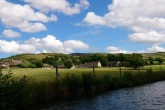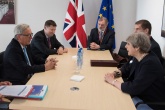Gove pledges to raise environmental ambition with ‘Green Brexit’
Michael Gove has pledged to recast the UK’s ambition for its environment, promising to deliver a ‘Green Brexit’ as business leaders call on the government to take leadership on the creation of a more sustainable economy.
In his first public speech as Environment Secretary this morning (21 July), Gove set out “a deliberately ambitious agenda” to take the opportunity to “reshape British laws to make it a world leader in green policies”.
Gove, one of the leading figures in the Leave campaign ahead of the referendum, told the WWF’s Living Planet Centre in Woking: “Leaving the EU gives us a once in a lifetime opportunity to reform how we manage agriculture and fisheries, how we care for our land, our rivers and our seas, how we recast our ambition for the country’s environment, and the planet. In short, it means a Green Brexit.”
Former Justice and Education Secretary Gove took over the role from Andrea Leadsom in June following the snap election, amidst strong criticism from campaigners and the Green Party regarding his previous stances on environmental protections and climate change.
One of the main fears created by the Brexit process is what will happen to the UK’s environmental laws – the majority of which come from Europe. Many worry that, despite the government’s pledge to transpose ‘the whole body’ of EU environmental law into UK law through the Repeal Bill, oversight and accountability for these laws could be lost along with the European Court of Justice (ECJ) and other EU institutions that currently monitor the legislation.
Gove, however, said today how he saw an opportunity to create a new industry of environmental enforcement in the UK: “In this unfrozen moment new possibilities occur. I can understand why, for some, this is a moment of profound concern. The European Union has, in a number of ways, been a force for good environmentally…. and I have no intention of weakening the environmental protections we have put in place while in the EU.
“Inside the EU, the European Commission and the ECJ have provided enforcement mechanisms. Understandably, some are asking what could or should replace them. My view is that we have an opportunity, outside the EU, to design more effective, more rigorous and more responsive institutions and other means of holding individuals and organisations to account for environmental outcomes.”
He continued: “We can not just help protect our precious environmental assets, we can also create an economic asset for the country. Just as Britain enjoys a massive competitive advantage in the provision of legal services because the world knows we have the best courts and judges, and so chooses to settle its disputes here, so if we establish ourselves as the home of the highest environmental standards, the most rigorous science and the most ambitious institutions then the world will look to us for environmental innovation and leadership.”
As well as the impacts of Brexit, the waste and resources industry has been crying out for some years for an idea of how the government sees its waste policy developing in the long term, with reports that Defra’s much-delayed 25 year plan could be shelved until 2018.
Referring briefly to the plan, which he admitted “has been longer in gestation than a baby elephant”, Gove said that he wants the plan to be “as ambitious as possible”, adopting “as rigorous a methodology as possible to setting goals and reporting success or failure”.
Raise ambitions and reverse decline
The Secretary read a Philip Larkin poem, ‘Going, Going’, commissioned by Edward Heath’s newly-established Department of the Environment in 1972, which decried the destruction of the UK’s natural environment at the hands of what Gove called “corporate greed, devil take the hindmost individualism, and modernist brutalism.”
He said that in the ensuing decades, climate change has threatened natural habitats and human societies and “extractive and exploitative political systems” have been allowed to lay waste to natural resources.
Describing himself as “an environmentalist first”, Gove referred to “spiralling levels of resource consumption, waste generation and demand for energy which all threaten human progress in the future”.
“But we should not aim simply to halt or slow the deterioration of our environment. We must raise our ambitions so we seek to restore nature and reverse decline. While the need for action on the environment has rarely been greater there are also, at this moment, forces at work which make me optimistic about our capacity to rise to this challenge - and in particular optimistic about the role our country can play.”
Gove pledged to take action against the growing amount of plastic being released into the world’s oceans, noting the success of the government’s English carrier bag charge, and upcoming ban of microbeads, for which a consultation summary document was also released this morning.
Nine billion fewer plastic bags are now used by shoppers in England following the introduction of the five-pence charge in October 2015, an 83 per cent reduction, with over £95 million donated to good causes through the charge. Just this week, Waitrose announced that it was donating £500,000 from the fund to the Marine Conservation Society to help organise beach and river litter clean-ups.
Business calls for zero-carbon action
The government’s motivation for taking steps to ensure a sustainable future will probably by helped by strong calls from the business world to step up leadership on carbon reduction.
Earlier this week, groups of leading companies and investors urged Theresa May to raise ambitions to tackle climate change and show leadership towards a more prosperous sustainable economy.
In a letter to the Prime Minister, the coalition of business groups representing thousands of companies with hundreds of billions in revenue, called on the government to drive jobs, sustainable growth and investment by demonstrating leadership in a low-carbon future.
It said that the government must set clear policies through flagship proposals like the Industrial Strategy and the Clean Growth Plan and work constructively with the EU to deliver global emission reductions.
The call was led by The Prince of Wales’s Corporate Leaders Group a select group of European business leaders including Sky, Unilever, Tesco, GlaxoSmithKline and EDF, along with IEMA, UK Green Building Council, techUK, Institutional Investors Group on Climate Change, RenewableUK, and the Environmental Industries Commission.
Jill Duggan, Director of The Prince of Wales’s Corporate Leaders Group,said: “The government may have a lot on their plate with Brexit negotiations, but answers around how the UK’s economy will evolve and modernise through the next decade are long overdue. Now is the time to display the vision, innovation and leadership needed to help UK industry transition to a low carbon economy.”
Michael Gove’s speech to the WWF can be read in full on Defra’s website.










